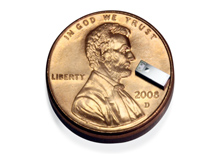It was beautiful sunny early Spring day, a Saturday as I recall. Trips were made to various stores to purchase items for school, then a last minute dash to the electronics store so I could pick up another charger for my cell phone. I ran ahead, my daughter and wife lagged behind, weary from the day's outing - at least so I thought.
I stood in line to pay for the charger, when both my daughter and wife came up to me smiling - not a pleasant smile - more a mischievous one. My daughter looked up at me.
"Dad, you won't believe what I found!"
The thoughts circled in my head: a new cell phone? Computer? Maybe a DVD? What?
"You have to be very quiet, and don't make any sudden movements. Promise?" she asked.
Not knowing better, I nodded agreement, puzzled as to her intent. Slowly, carefully, she withdrew the sleeve on her fleece coat to reveal the tiny treasure she had found outside: the head of a tiny bird - a small wren - with a beautiful iridescent gold stripe above each of its its tiny dark, terrified eyes. She covered it again.
"I found it outside, Dad, as we were coming in. I think it hit the window, it can't move its legs. We can help it, can't we? I was worried a dog would get him or something, Dad. We have that old birdcage..."
I looked at my wife. There was that less-than-reassuring smile again.
"Um, well, I suppose. You'll have to look up how to feed the poor thing..."
"Oh, I will!"
And so I payed for the charger and we hurried home. As I drove, I remembered a similar scenario with a bird I had found as a child.
We lived in the country then, and sparrows were plentiful, as were picture windows. My mother must have felt the same way as I had felt in that store when I came to her with my own tiny find as a boy. She was more mature, understanding, and had seen these situations before. Yet she helped me care for my tiny friend with all the anticipation of the Great Recovery that was sure to follow. My terrarium was turned into a makeshift veterinary hospital: plenty of water for the bird, seed, grass all around, even soft laundry lint to serve as a soft bed for tiny patient. A small lamp was placed over the terrarium to provide warmth - surely, this should help, I thought.
So I waited and watched - even inviting my friend over to see the infirmary. The novelty of the captive patient generated plenty of excitement about the potential for helping the tiny creature, even though I was never quite sure what I could really do to fix the underlying problem.
It didn't matter, I've come to learn.
It didn't take long to realize my first patient wouldn't eat. It couldn't drink. I tried eye droppers with water and milk-soaked bread to no avail. Only tiny bits of scrambled egg held in a tweezer garnered a bit of interest, but even then, only briefly. It was difficult, I found, to clean the one tidy cage without terrifying the little guy. I grew saddened and frustrated as I realized the likely outcome. One thing led to another and, despite my very best efforts and perseverance, I later found my tiny, helpless, and winged patient lifeless and still.
But my daughter didn't need to hear this story then. It was not time. We had too much to do to prepare for the next Great Recovery, and like me, more enthusiasm, care, love and tenderness were soon to be showered upon that tiny baby wren.
As I reflect of that experience as a boy, and later again with my wife and daughter, there was much to be learned from the experience of caring and offering compassion, one that mothers seem uniquely gifted at imparting to their children. Mothers are special that way. My mother showed me the importance of caring first-hand, never flinching even when the odds are stacked against you and your tiny aviary friend.
And now, almost ironically, I find my most special 85-year-old wren is fighting to recover from a fractured ankle in a terrarium-like rehab facility far, far away.
Strange food. Strange people. Strange sounds.
One day blurring to the next.
And hopefully soon, around the corner, the next Great Recovery.
-Wes
